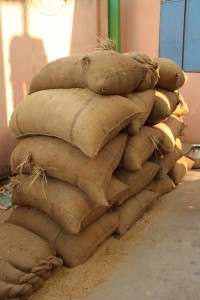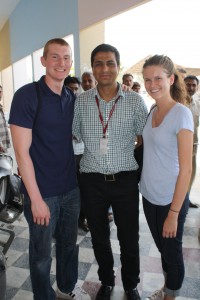Reflection on Stepping out of Our Comfort Zones in India
By Rachael Jensen and Annie Stasaitis, College of Business Supply Chain Management students
The following post was written by students on an ADM Institute-sponsored observation study tour through India in March 2015.

Farmers often report no losses, because losses given a certain technology are assumed. Pictured: holes in gunny sacks stuffed with hay at a rice mill in Chennai, India. Credit: ADMI/K. Wozniak
As our trip comes to a close, we now have time to reflect on what we’ve accomplished during our time in India. The 7 days we spent here have been eye-opening and full of adventure.
Daily, we stepped out of our comfort zone to immerse ourselves in the local culture and explore the agricultural supply chain.
This trip was big for us – we learned a lot about the local culture and agricultural supply chains of India. One thing that stuck out was the fact that most farmers did not say they were experiencing postharvest loss. This was not due to pride but more due to ignorance – they did not know what should be considered a loss. For example, most farmers denied that they lost crops in transportation when in fact they were using open-air trolleys on very bumpy Indian roads. They also didn’t recognize the amount of crop they lost while bagging and storing. As a group, we questioned the farmers and concluded that they saw the postharvest loss as something that was natural with the farming practice and they were not concerned about the loss.

Rachael (right) and her classmates had the unique chance to talk with and learn directly from locals – farmers, commission agents, traders, vendors, professors, and students. Credit: ADMI/K.Wozniak
Another big thing that stuck out to us was how poverty and wealth were intertwined. At any block, you could see a very prosperous store and then next to it a person living in a hut. The drastic difference was very common and by the end of the trip, we found ourselves starting to overlook it. Although Delhi was less drastic than Chennai, it was still not uncommon to see a large bus, a motorcycle, a cow and a horse-pulled buggy all fighting for the same road. When we were in Chennai, we stopped and had the chance to look around some rural village homes. It shocked us how simply they lived. One hut that was about the size of a typical apartment bedroom where we are from housed 7 people. These villagers weren’t embarrassed by their lack of extravagance but rather welcomed us into their homes with open arms. We were pleased to find this friendly demeanor throughout the country; we were warmly welcomed everywhere we went.
We are so grateful to the ADM group and our chaperones, Professor Palekar and Kari Wozniak, for making this trip possible. We were put in situations that challenged our comfort zones and because of that, we are leaving India more aware of different cultural issues and ways of life. The farmers were able to teach us their processes and daily life, which helped us think of situations in a different light. Without advanced education, they properly utilize the theories that we study in our supply chain courses without even knowing that they are worldly models. This showed us how applicable our field of study is to emerging economies, reassuring us that we have the potential to make a difference in the world. We hope that we have left an impact on the local farmers as they have on us.
Rachael and Annie were participants in the 2015 Supply Chain Management India study abroad trip organized by the program director in the College of Business at the University of Illinois at Urbana-Champaign, Professor Udatta Palekar. Throughout the 10-day trip, students observe how agricultural products in India move through supply chains from farm to consumer with a special focus on postharvest losses.
Read more blogs in this series:
Hearing from locals on farming in south India: Day 1
Things are heating up in India: Day 2
Commissioner commentary: Day 6
Farming systems in north vs. south India: Day 7
Other localized supply chains: Day 8



Add Comment